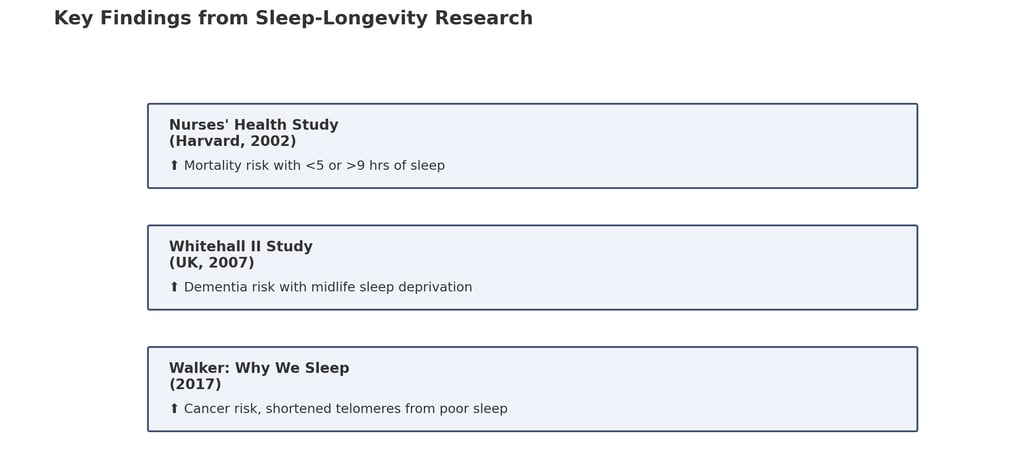Understanding Sleep: The Stages, Their Importance, and the Connection to Longevity
Sleep is not a luxury. It's a biological necessity as fundamental to health as nutrition and exercise. Modern science is revealing just how vital sleep is for longevity, disease prevention, and cognitive function. In fact, consistently good sleep may be one of the most powerful tools we have for extending healthspan—the number of years we live free from chronic disease.
Dr Ari Sahebkashaf - The Longevity Lab MD
6/12/20253 min read


The Architecture of Sleep
Sleep is composed of cycles, each lasting approximately 90 minutes, and repeated 4 to 6 times per night. Each cycle includes:
N1 (Stage 1): Light sleep. A transitional phase where you drift in and out of wakefulness.
N2 (Stage 2): Deeper than N1. Heart rate slows, and body temperature drops.
N3 (Stage 3): Deep sleep or slow-wave sleep. Essential for physical restoration, immune function, and hormonal balance.
REM (Rapid Eye Movement) Sleep: Brain becomes more active, and most dreaming occurs. Crucial for memory consolidation, learning, and emotional regulation.
Why Each Sleep Stage Matters
N1 & N2: Help transition the body into deeper sleep while supporting cardiovascular stability.
N3: Also known as "restorative sleep," this stage is where tissue growth and repair occur. It is critical for muscle recovery, immune defense, and growth hormone release.
REM Sleep: Enhances cognitive functions like problem-solving, creativity, and emotional processing. REM is especially sensitive to disruption and becomes longer with each successive cycle in the night.
Sleep Quality and Longevity: The Science Behind It
The relationship between sleep quality and longevity has gained significant attention in recent years, supported by a growing body of research. Sleep is not merely a period of rest but a complex physiological process crucial for the maintenance of health and wellbeing. Various studies suggest that both the duration and quality of sleep are intimately linked to life expectancy, highlighting the importance of prioritizing good sleep practices to enhance longevity.
Research has consistently shown that individuals who allocate sufficient time for sleep are more likely to enjoy prolonged lives compared to those who experience chronic sleep deprivation. Sleep facilitates vital biological processes, including cellular repair and immune function enhancement. During deep sleep stages, the body works to repair damaged cells and tissues, produce important hormones like growth hormone, and reinforce the immune system. These processes are essential in combating the aging effects on the body and contribute to overall health.
Moreover, sleep quality appears to have a direct impact on hormonal balance. Poor sleep can lead to disruptions in the regulation of stress hormones, such as cortisol, and metabolic hormones, like insulin. Such imbalances may predispose individuals to chronic conditions such as obesity, diabetes, and cardiovascular diseases, all of which can diminish life expectancy. Consequently, the correlation between sleep quality and longevity extends beyond mere time spent sleeping; it is the restorative properties of high-quality sleep that significantly contribute to healthy aging.
The dangers associated with chronic sleep deprivation are also noteworthy. Research indicates that inadequate sleep can result in cognitive decline, mood disorders, and even increased mortality risk. In light of these findings, it is crucial for individuals to understand the significance of maintaining both sleep quality and duration to not only prolong life but also enhance the quality of those extra years.
Consequences of Sleep Deprivation
Chronic poor sleep affects nearly every system in the body:
Brain: Increased risk of Alzheimer's disease, depression, and poor memory
Cardiovascular System: Elevated blood pressure, inflammation, and risk of heart disease
Immune System: Reduced natural killer cell activity, leading to higher infection and cancer risk
Metabolism: Insulin resistance, increased appetite, and obesity risk.
Optimizing Sleep for Longevity
Stick to a regular sleep schedule, even on weekends
Create a cool, dark, and quiet sleep environment
Avoid screens 1 hour before bed (blue light suppresses melatonin)
Limit caffeine and alcohol, especially in the afternoon
Get sunlight exposure early in the day to align circadian rhythm
Consider wearable sleep trackers for personalized insights (like Oura, WHOOP, or Garmin)
Supplement and Lifestyle Support for Better Sleep
If you're still struggling with sleep despite good sleep hygiene, certain supplements and strategies may support better rest:
Magnesium (especially glycinate or threonate): Promotes relaxation and supports nervous system health.
Melatonin: A natural hormone that regulates the sleep-wake cycle. Useful for jet lag or shifting sleep schedules.
L-theanine: An amino acid found in green tea that promotes calmness without sedation.
GABA or 5-HTP: Neurotransmitter precursors that may support relaxation and serotonin balance.
Herbal options: Chamomile, valerian root, passionflower, and ashwagandha are commonly used in teas or supplements.
****Always discuss these options with your healthcare provider before starting any new supplement or sleep aid.








